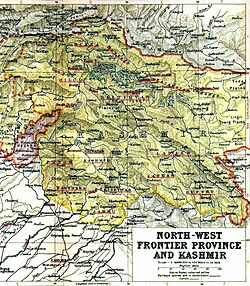Kashmir and Jammu (princely state)
| Jammu and Kashmir | ||||||
| Princely State of British India | ||||||
|
||||||
|
||||||
| Map of Kashmir | ||||||
| Historical era | New Imperialism | |||||
| • | Established | 1846 | ||||
| • | Disestablished | 1952 | ||||
| Today part of | China, India and Pakistan | |||||
Jammu and Kashmir was, from 1846 until 1952, a princely state in the British Empire in India, and was ruled by Jamwal Rajput Dogra Dynasty. The state was created in 1846 after the First Anglo-Sikh War as per the Treaty of Amritsar. The East India Company annexed the Kashmir Valley,Ladakh, and Gilgit-Baltistan from the Sikhs, and then transferred it to Gulab Singh in return for an indemnity payment of 7,500,000 Nanakshahee Rupees.
At the time of the Indian independence, Maharaja Hari Singh, the ruler of the state, preferred to become independent and remain neutral between the successor dominions of India and Pakistan. However, an uprising in the western districts of the State followed by an attack by raiders from the neighbouring Northwest Frontier Province, supported by Pakistan, put an end to his plans for independence. On 26 October 1947, the Maharaja signed the Instrument of Accession joining the Dominion of India in return for military aid. The western and northern districts presently known as Azad Kashmir and Gilgit-Baltistan passed to the control of Pakistan.
The Dogra state in Jammu was established by Dhruv Dev during the declining years of the Mughal Empire. Raja Gulab Singh, his direct descendant, was 16 years old when, in 1808, the Sikh Empire under Maharaja Ranjit Singh conquered Jammu. Gulab Singh and his two brothers, Dhyan Singh and Suchet Singh, went on to enrol in the Sikh troops. Gulab Singh soon distinguished himself in battles, and was awarded a Jagir near Jammu and allowed to keep an independent force. After the conquest of Kishtwar (1821) and the subjugation of Rajouri, he was made a hereditary Raja of Jammu in 1822, with an annual allowance of 300,000 rupees. Ranjit Singh personally anointed him as the Raja. His brother Dhyan Singh received Poonch and Suchet Singh Ramnagar.
...
Wikipedia



